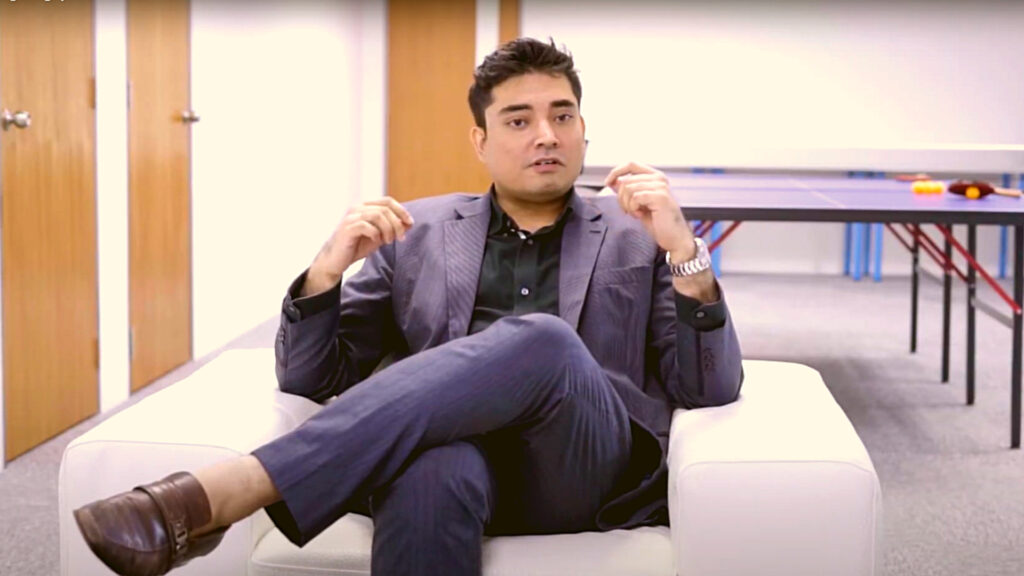Sancy Suraj is a name synonymous with memory sports, having won numerous awards and accolades for his memory skills. But he is also a successful entrepreneur who has built a global empire with the Knowles Training Institute. As the editor of this piece, it is my pleasure to provide insights into Sancy’s journey to success and his perspective on the global expansion of his company. In this article, we will delve into his experiences, both as a memory athlete and an entrepreneur, and gain valuable insights into his strategies and mindset.

How did it feel to win the World Memory Championships, and what was your strategy going into the competition?
Winning the World Memory Championships was a truly surreal and fulfilling experience for me. It was an incredible feeling to know that I had been able to showcase my abilities on a global stage and come out on top. The competition was incredibly tough, with some of the world’s best memory experts from around the globe competing against each other. Therefore, winning the championship was not only a personal achievement but also a testament to the hard work and dedication that I had put into mastering my memory skills over the years.
My strategy going into the competition was to stay focused, calm, and consistent throughout the entire event. I knew that I had to pace myself well and maintain my concentration, especially during the longer events, such as memorizing numbers and binary digits. To achieve this, I had a strict training regime leading up to the event, which involved daily practice sessions, mental preparation exercises, and relaxation techniques to keep my mind and body in optimal condition. Additionally, I also made sure to get enough rest, eat healthily, and stay hydrated during the competition days to ensure that my physical and mental energy levels remained high.
Furthermore, I believe that visualization played a crucial role in my success at the championships. Before each event, I would visualize myself successfully memorizing the given information and recalling it with ease during the recall phase. This helped me build confidence and reduce anxiety, allowing me to perform at my best under pressure. Overall, winning the World Memory Championships was a dream come true, and I’m grateful for the opportunity to have represented Singapore and showcased my memory skills on a global stage.
Can you describe one of your most challenging memory feats, and how you were able to accomplish it?
One of my most challenging memory feats was when I memorized a deck of cards in under two minutes. This was a daunting task for me because I had never attempted to memorize a full deck of cards before, and the sheer volume of information seemed overwhelming at first. However, I was determined to succeed, and I used a combination of visualization techniques, memory palaces, and chunking to accomplish this feat.
To begin, I assigned each card in the deck to a particular image, making sure that each image was distinct and memorable. For example, I would associate the Ace of Spades with a spade digging into the ground or the Queen of Hearts with a heart-shaped crown. Then, I visualized each image in a specific location within a memory palace. For instance, I might imagine the spade digging into the ground in the first room of the palace, while the heart-shaped crown sits atop a throne in the second room. By creating vivid mental images and linking them to specific locations, I was able to create a cohesive mental map of the entire deck of cards.
Next, I used chunking to further organize the information. I divided the deck into groups of four, and then linked each group to a particular location within my memory palace. This made it easier for me to remember the order of the cards and recall them during the recall phase of the competition.
Finally, I practiced this technique extensively leading up to the event. I would time myself, trying to memorize the deck of cards in under two minutes, and then recall the order of the cards afterward. This helped me refine my technique and build confidence in my abilities.
Overall, memorizing a full deck of cards was one of the most challenging memory feats I’ve attempted. However, by using visualization, memory palaces, chunking, and extensive practice, I was able to accomplish this feat and improve my memory skills along the way.
How do you maintain focus and mental stamina during competitions, and what techniques do you use to stay calm and centered?
Maintaining focus and mental stamina during competitions is essential for success, especially when it comes to memory sports. To do this, I use a variety of techniques to stay calm and centered, such as breathing exercises, mindfulness meditation, and positive self-talk.
One technique that I find particularly useful is deep breathing. Before each event, I take a few deep breaths to calm my nerves and center myself. This helps me relax and focus on the task at hand. During the event, I continue to use deep breathing to help me stay calm and maintain my concentration.
Mindfulness meditation is another technique that I use to improve my mental stamina. By practicing mindfulness, I’m able to develop greater awareness of my thoughts and emotions, which allows me to better manage them during competition. This helps me avoid distractions and stay focused on the task at hand. In addition, mindfulness meditation can also help me reduce anxiety and stress, which can negatively impact my performance.
Finally, positive self-talk is another technique that I use to stay focused and maintain my mental stamina. By telling myself positive affirmations, such as “I can do this” or “I am capable and prepared,” I’m able to build confidence and reduce self-doubt. This helps me maintain a positive mindset during competition, even in the face of challenges or setbacks.
In summary, maintaining focus and mental stamina during competitions is crucial for success in memory sports. By using techniques such as deep breathing, mindfulness meditation, and positive self-talk, I’m able to stay calm and centered, manage my emotions and thoughts effectively, and maintain my concentration and focus throughout the competition.
“Mastering the mind is just as important as mastering the memory. By utilizing techniques such as deep breathing, mindfulness meditation, and positive self-talk, we can cultivate the mental stamina and focus necessary to achieve success in any competition, including memory sports.”
What are some of the biggest lessons you’ve learned from competing in memory championships, both about memory techniques and about yourself?
Competing in memory championships has taught me many valuable lessons, both about memory techniques and about myself. One of the biggest lessons I’ve learned is that memory is not just about intelligence, but also about practice and perseverance. With dedicated practice and consistent effort, anyone can improve their memory skills and achieve impressive results.
Another lesson I’ve learned is the importance of setting clear goals and working towards them. By setting specific, measurable goals for myself, I’ve been able to focus my efforts and track my progress over time. This has helped me stay motivated and driven, even when faced with challenges or setbacks.
Additionally, competing in memory championships has taught me the importance of mental discipline and focus. To perform at my best, I need to be able to concentrate deeply and maintain my mental stamina throughout the competition. This requires mental discipline and focus, which I’ve been able to cultivate through mindfulness meditation, positive self-talk, and other techniques.
Finally, I’ve learned that the power of memory extends far beyond competition. By improving my memory skills, I’ve been able to enhance my learning and recall abilities in other areas of my life, such as academic or professional pursuits. Memory techniques have also helped me better understand and retain information in a variety of contexts, which has been incredibly valuable.
In summary, competing in memory championships has taught me many important lessons about memory techniques, goal-setting, mental discipline, and the power of memory in everyday life. These lessons have not only helped me improve my performance in competitions but have also enhanced my overall learning and recall abilities in other areas of my life.
How important is mindset when it comes to memory training and competition, and how do you cultivate a positive mindset?
Mindset is incredibly important when it comes to memory training and competition. In order to perform at our best, we need to cultivate a positive and focused mindset. This involves developing a growth mindset, focusing on progress rather than perfection, and maintaining a positive attitude even in the face of challenges or setbacks.
To cultivate a positive mindset, I use a variety of techniques such as positive self-talk, visualization, and mindfulness meditation. Positive self-talk involves using affirmations and positive statements to encourage and motivate ourselves. By telling ourselves that we are capable, strong, and resilient, we can build confidence and reduce self-doubt.
Visualization is another technique that I use to cultivate a positive mindset. By visualizing myself performing well in competition and achieving my goals, I’m able to build confidence and focus my efforts towards success. This helps me stay motivated and driven, even when faced with challenges or setbacks.
Mindfulness meditation is another technique that I use to cultivate a positive mindset. By practicing mindfulness, I’m able to develop greater awareness of my thoughts and emotions, which allows me to better manage them during competition. This helps me avoid distractions and stay focused on the task at hand. In addition, mindfulness meditation can also help me reduce anxiety and stress, which can negatively impact my performance.
Overall, mindset is crucial when it comes to memory training and competition. By cultivating a positive and growth-oriented mindset, we can enhance our performance, build confidence, and achieve our goals. Techniques such as positive self-talk, visualization, and mindfulness meditation can all be used to develop a positive mindset and achieve success in memory sports.
“A positive mindset is not just a nice-to-have, it’s a must-have for success in memory training and competition. By cultivating a growth-oriented mindset and using techniques such as positive self-talk, visualization, and mindfulness meditation, we can enhance our performance, build confidence, and achieve our goals.”
Sancy’s success in the world of memory sports is nothing short of impressive, having memorized large volumes of abstract images, numbers, and words in record-breaking times. But his accomplishments go beyond just memory sports, having established the Knowles Training Institute, which has grown to become a global provider of corporate training and consultancy services. In this article, Sancy shares his experiences, lessons learned, and advice for those seeking to excel in memory sports or the business world.
Sancy shares his perspective on how he was able to accomplish one of his most challenging memory feats and how he stays motivated and focused during long periods of memory training. He also talks about the role of creativity in memory training and how to cultivate a positive mindset. Furthermore, Sancy sheds light on the importance of mindset when it comes to memory training and competition, and how he stays calm and centered.
Additionally, Sancy explains how his approach to memory training and entrepreneurship has evolved over time, and what new techniques or strategies he has incorporated. He also provides advice for those who want to improve their memory skills and compete in memory championships.

What role does creativity play in memory training, and how do you come up with new and innovative ways to remember information?
Creativity plays a vital role in memory training. One of the most effective ways to remember information is to create memorable and unique associations between the information and something else that is memorable or easily visualized. The more creative and unique the association, the more likely it is to be remembered.
As a memory athlete, I constantly seek out new and innovative ways to remember information. This involves tapping into my creativity and imagination to come up with unique associations and visualizations. For example, when memorizing a list of words, I might create an image in my mind that combines all of the words into a single scene or story. The more creative and vivid the scene, the easier it is to remember the words.
Another technique that I use to boost my creativity is to incorporate humor into my memory associations. By making the associations humorous or ridiculous, I’m able to make them more memorable and unique. This also helps to keep my training sessions fun and engaging, which helps me stay motivated and focused.
In addition to using creative associations and humor, I also try to use a variety of different memory techniques and strategies to keep my training fresh and engaging. For example, I might experiment with different mnemonic devices, such as the Method of Loci or the Major System, to see which works best for me. By constantly seeking out new techniques and approaches, I’m able to stay engaged and motivated in my memory training.
In summary, creativity is essential in memory training. By using creative and innovative techniques to remember information, memory athletes can improve their performance and achieve greater success. Humor, vivid associations, and a willingness to try new approaches are all key components of a successful memory training program.
How has your approach to memory training evolved over time, and what new techniques or strategies have you incorporated?
My approach to memory training has evolved significantly over time as I have gained more experience and knowledge about memory techniques and strategies. Early on, I focused primarily on building my memory skills through repetition and memorization exercises. However, as I continued to compete in memory championships and learn from other memory athletes, I began to incorporate a wider range of techniques and strategies into my training.
One of the biggest changes in my approach to memory training has been the emphasis on visualization and creating memorable associations. I have learned that the key to remembering large amounts of information is to make it meaningful and memorable. By creating vivid and imaginative associations between the information and something else, I’m able to recall it more easily and with greater accuracy.
Another technique that I have incorporated into my training is the use of memory palaces. Memory palaces involve visualizing a familiar location, such as a childhood home or a favorite park, and mentally placing pieces of information in different locations within that space. This technique has been incredibly helpful in allowing me to remember long lists of items, such as names or numbers, in a specific order.
Additionally, I have also started to focus more on developing my overall mental and physical health. I have found that staying physically fit and maintaining a healthy diet can have a significant impact on my memory performance. I have also incorporated mindfulness and meditation practices into my training, which have helped me to stay calm and focused during competitions.
Overall, my approach to memory training has become more holistic and varied over time. By incorporating a range of techniques and strategies, as well as focusing on my overall health and wellness, I have been able to achieve greater success in memory competitions and improve my memory skills in everyday life.
How do you stay motivated and focused during long periods of memory training, and what advice do you have for people struggling with motivation?
Staying motivated and focused during long periods of memory training can be challenging, but it is essential for achieving success in memory competitions. One of the key strategies that I use to stay motivated is setting clear goals and targets. I set specific, measurable goals for each training session, which gives me a sense of purpose and direction. These goals help me to stay focused and motivated, even when the training becomes tedious or challenging.
Another important factor in maintaining motivation is to vary the training routine. Repetition can quickly become monotonous, so I try to mix up my training sessions by incorporating new techniques or challenges. I also try to keep things fun and engaging by incorporating games or challenges into my training sessions.
To stay focused during long periods of memory training, it’s essential to take regular breaks and give your mind a chance to rest. I try to take short breaks every hour or so, during which I step away from the training and engage in a different activity, such as taking a walk or doing some stretching. This helps me to recharge and refocus when I return to the training.
For those struggling with motivation, my advice would be to find a way to make the training fun and enjoyable. Experiment with different memory techniques and find the ones that work best for you. Try to make the training social by training with friends or participating in online memory communities. Celebrate your successes along the way, no matter how small they may be, as this will help to keep you motivated and focused on your goals.
Lastly, it’s important to remember that progress in memory training takes time and effort. Don’t be too hard on yourself if you don’t see results right away. Keep practicing and stay committed to the process, and the results will come. Remember why you started memory training in the first place, and let that motivate you to keep going, even during the most challenging training sessions.
Can you share an example of a time when you applied your memory skills in a practical or everyday setting, outside of competition?
As a memory athlete, I am constantly using my memory skills in everyday life, from remembering names and faces to recalling important information. One example that comes to mind is when I was in university and had to memorize a large amount of information for my exams.
I used a technique called the Memory Palace, which involves creating a mental image of a familiar location and associating each piece of information with a specific location in that space. I visualized my childhood home and associated each piece of information with a specific room or area of the house.
This technique allowed me to easily recall the information during the exam, and I was able to achieve a high score as a result. I have also used this technique when giving presentations or speeches, where I have to remember a lot of information in a short amount of time.
In my personal life, I have also used my memory skills to remember important dates and events, such as birthdays or anniversaries. I often use visualization techniques to create mental images that help me remember these dates, and I have found that this has helped me to stay more organized and on top of important events.
Overall, my memory skills have been incredibly useful in both practical and everyday settings, and I believe that everyone can benefit from learning memory techniques to help them remember important information and stay organized in their daily lives.
What advice would you give to someone who is interested in competing in memory championships, or simply improving their memory skills?
My advice for anyone interested in competing in memory championships or simply improving their memory skills would be to start small and build gradually. Memory techniques require practice and consistency to master, so it is important to be patient and not expect overnight results.
One of the best ways to start is by using simple techniques like visualization and association to remember small pieces of information, such as a shopping list or a phone number. From there, you can gradually increase the complexity of the information you are trying to remember and experiment with different techniques to find what works best for you.
It is also important to have a structured and consistent practice routine. Just like with any other skill, regular practice is key to improving your memory abilities. Set aside a specific time each day or week to practice memory techniques and stick to it.
Another important aspect of memory training is staying motivated and setting goals for yourself. Keep track of your progress and celebrate your successes, no matter how small they may seem. Having a positive attitude and believing in yourself is crucial to achieving your goals.
Finally, don’t be afraid to seek out resources and support from other memory athletes or memory experts. There are many books, websites, and online communities dedicated to memory training, and these can be valuable resources for learning new techniques and staying motivated.
In summary, my advice for anyone interested in competing in memory championships or improving their memory skills is to start small, be consistent with practice, stay motivated, set goals, and seek out resources and support. With dedication and persistence, anyone can improve their memory abilities and achieve their goals.
“Memory techniques require practice and patience, but with dedication and a positive attitude, anyone can improve their memory abilities and achieve their goals.”
In conclusion, Sancy Suraj’s story is an inspiration to many who aspire to achieve great things in memory sports or the business world. Through his journey, we have gained valuable insights into the importance of mindset, creativity, motivation, and persistence in achieving success. We hope this article will serve as a valuable resource for those looking to follow in Sancy’s footsteps and build their own empires.
















